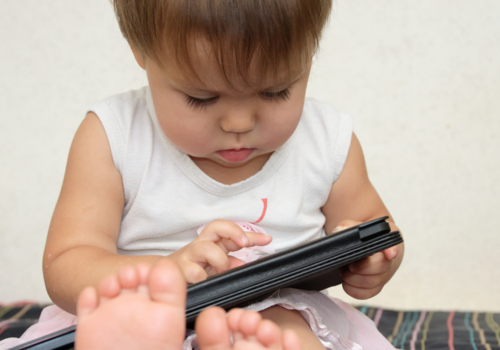
Some babies born during COVID are developing more slowly and talking less than babies born before the pandemic, new research shows. But parents can help their babies catch up.
“I’m seeing children with global delays; with deficits in really early pre-language skills like pointing, giving, and reaching,” says Rhode Island speech-language pathologist Alyssa Loberti, M.S. CCC-SLP.
Less Parent-Baby Interaction Leads to Babies Talking Less
Due to stress, burnout, and other reasons, some parents had less than typical back-and-forth interaction with their babies during the height of COVID. As a result, the babies heard fewer words and some now have “significantly less vocalizations” than those born before the pandemic, finds Brown University’s Advanced Baby Imaging Lab.
Less Baby Brain White Matter
ABI Lab imaging reveals some babies also have comparatively less white matter, a structural element the brain needs to learn and process information.
“It is the conversational turns that drive brain development,” ABI Lab chief investigator Sean Deoni, told The 74.
Developmental Deficits Linked to Screentime
Speech-language pathologist Loberti also sees a link between her young clients’ developmental deficits and how much time they have spent watching screens.
A new JAMA Pediatrics study of Chinese moms and babies conducted during the pandemic lockdown shows that “excessive screen exposure in early years is associated with poorer cognitive and social-emotional development, especially working memory capacities.” The babies studied who had little to no screen exposure have few learning and attention issues.
Children’s Apps Shown to be Manipulative
Meanwhile, another study in JAMA Pediatrics finds that many apps are made to manipulate and confuse little kids. The apps use design techniques that keep little ones engaged in games, make appeals to spend money on extras, and force extended viewing of ads.
For instance, 1 in 5 of the popular apps that were analyzed use pressure tactics, such as when the narrator of ABC Animals says, “You can play with these cute animals for a tiny fee! Ask your parents!”
An ad in the app Mr. Bullet won’t disappear until the child swipes the screen and, as the study states, “makes Santa shoot people”.
Caregiver Interaction Boosts Brain Development Not Just in COVID Babies
Along with dire findings, JAMA Pediatrics gives parents keys to improvement. Providing “cognitively stimulating activities” such as playing with non-electronic real-life objects, reading, and back-and-forth interaction with caring people leads to a child’s “optimal general ability development.”
Indeed, the non-profit LENA (Language ENvironment Analysis) followed a group of 9- to 14-year-olds and found that “adult-child conversations influence a child’s IQ, verbal comprehension and vocabulary scores 10 years later.”
The LENA study concludes: “These data support the hypothesis that early talk and interaction, particularly during the relatively narrow developmental window of 18 to 24 months of age, can be used to predict school-age language and cognitive outcomes.”
Speech-language pathologist Loberti sees major improvements when parents supplement what their little ones may have lacked during in the pandemic. By doing so, she says, “The changes have been phenomenal.”
About the author:
Jenifer Joy Madden is a certified digital wellness educator, health journalist, and mother of three. She founded DurableHuman.com in 2009 and has written self-help books including How To Be a Durable Human: Revive and Thrive in the Digital Age Through the Power of Self-Design.



